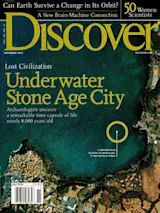Around 6 million years ago, some unknown genetic changes caused chimpanzees and humans to diverge from a common ancestor and set off along very different evolutionary paths. John McDonald, a molecular evolutionist at the University of Georgia, attributes this split to a most unlikely trigger—bits of "junk" DNA that we probably inherited from ancient viruses.
The human genome is littered with scraps of DNA that serve no clearly defined function. Scientists believe these transposons—so called because they can jump around the chromosomes—were acquired millions or billions of years ago, when viruses inserted their own DNA into that of the host. Until recently, transposons were regarded as genetic junk. But when geneticists discovered that the junk accounts for nearly half of our genome, "people started to seriously consider that they might contribute to evolution," McDonald says.
McDonald and King Jordan from the National Institutes of Health in Bethesda, Maryland, have now ...














